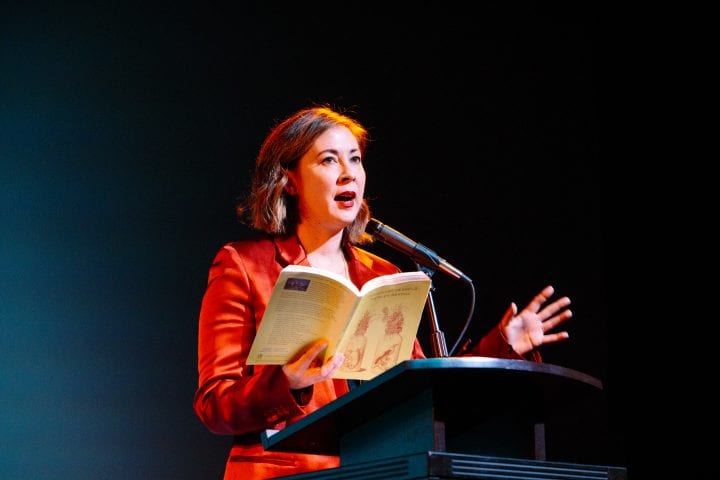
Introductions: Paisley Rekdal
February 12, 2020
By Rebecca Hoogs, SAL Associate Director
Born and raised in Seattle, Paisley Rekdal went to school at the University of Washington before continuing her studies at the University of Michigan and University of Toronto. She is now a professor at the University of Utah in Salt Lake City, where it is surely sunnier and drier than it is here in the perma-deluge of Seattle, and where she is also the Utah State Poet Laureate. That said, Washington has drawn her, or her work back at least, as her two most recent books of poetry (following three previous collections) were published to great acclaim by our very own Copper Canyon Press.
Her most recent collection, Nightingale, takes up, takes on, Ovid’s Metamorphoses as a lens through which to see and re-see and say and re-say narratives of sexual assault, violence, silence, and speech. Her poems splice and spiral narrative and lyric intensity together much like her poem, “The Olive Tree at Vouves,” does at the end of “Nightingale”: “To write / about the tree is not / to write about the human, and yet / to see this olive / split in two—or is it / two trees woven into one…” Were they two twined together or one split? Either way, there is a pain to the entanglement—a rupture or a capture that is embodied in the bodies in all of these poems in this haunting and haunted collection.
Whether human or animal (often both), Rekdal splits them and us, the reader, open, examining the guts of a story, a trauma, a grief, a birth, a death, a memory, for some augury of meaning. Publishers Weekly called the work a “riveting poetic alchemy” and Ploughshares praised the way Rekdal “allowed us to connect with another intellect, to inhabit it tactilely, even as we are inescapably where we are, inevitably ourselves, inside bodies that carry our traumas with them.” We cannot go back the way we came. Stories, too—whether said or unsaid—leave a trace. Rekdal’s poems show us the power and residue of raveling and unraveling, traveling and un-traveling.
Two weeks ago, we hosted short story writer and memoirist Carmen Maria Machado—hailed for her groundbreaking reformulation of her memoir, In the Dream House, and for telling the story of the domestic abuse she suffered at the hands of her partner. And, last week we hosted New York Times reporters Jodi Kantor and Megan Twohey to talk about their book, She Said: Breaking the Sexual Harassment Story that Helped Ignite a Movement.
Like those writers, Rekdal is powerfully revealing traumas that have been untold for too long, or told only by men, or told just one way out and back. The narrative, we know, is more complicated. The narrative is changing. Is about change. Rekdal’s works of poetry and prose are vital contributions to the critical national conversations swirling all around us and make us see and feel deeply just how transformative language can be.
Paisley Rekdal gave a reading at Hugo House on February 6, 2020, as part of our 2019/20 Poetry Series; SAL Associate Director Rebecca Hoogs gave this introduction.